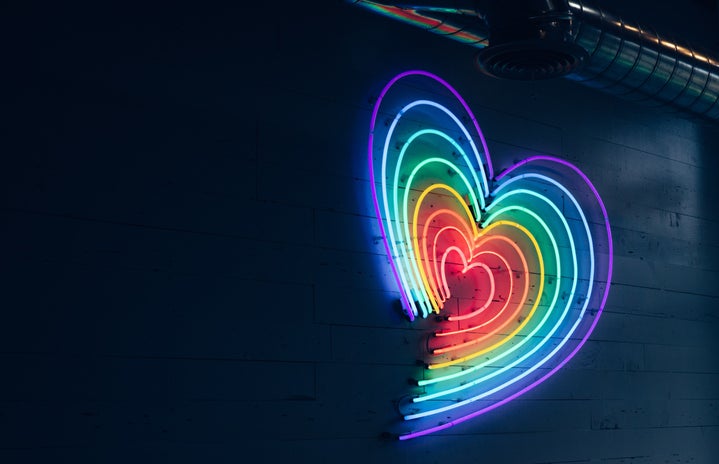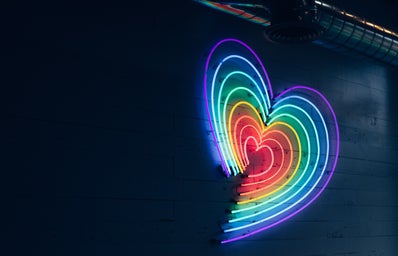Beyond all the eyeshadow, strobe lights, bicycles and glitter, HBO’s new Gen Z-centered series, Euphoria, has proven itself to be so much more than “just another show about high school.” In particular, the show’s first season provided a thought-provoking look into sexuality, and more importantly, how complicated and multidimensional it can be for young adults in the modern era.
Growing up in a society of screens, millennials have been constantly force-fed age-old romantic stereotypes: guy meets girl, they fall in love, happily ever after. Luckily, the entertainment industry has flourished in the past decade with same-sex representation in TV and film. The only thing they forgot was us: the lost 20-somethings who don’t even know who the hell they are yet and as a result, have no idea what kind of person might complement them romantically. There seems to be a lack of face time today for us sexual floaters that aren’t necessarily standing on one side or the other. Whether intentional or not, Euphoria shed light on pansexuality—an orientation with a belief at its core that love is blind. This is an idea that the world needs to hear at this moment more than ever,
Euphoria follows the story of Rue, a 17-year-old recovering drug addict, that falls in love with the eccentric—yet enthralling—new girl in town, Jules. The relationship that blossoms between the pair is one of deep understanding, a rarity for both due to their respective circumstances (Rue, a struggling substance abuser and Jules, a transgender female.) One important thing to note is that neither girl’s sexuality is ever explicitly stated in the show, but both have had sexual encounters with men. In addition, neither girl expressed ever previously having a romantic interest in the same sex. The reason why I feel pansexuality has a chord to play for these two is found in that fact alone. Neither one had previously pursued a same-sex relationship but they fell in love regardless.
Webster’s Dictionary defines the term pansexual as: of, relating to, or characterized by sexual desire or attraction that is not limited to people of a particular gender identity or sexual orientation.
It’s notable as well that another character in the show, Maddy, even says towards the end of the season: “sexuality is a spectrum, nobody is completely straight or completely gay.” This quote is almost identical to Hickman’s statement above on the “0-6 scale.” The love that Rue and Jules shared was something that went deeper than gender alone—something so spiritual that physical attributes could not question it.
The reason why pansexuality seems to linger over Rue and Jules’ relationship as opposed to homosexuality is because their attraction to each other didn’t make them question their attraction to other genders as a whole. They just clicked. It is so refreshing to see a “virgin” same-sex storyline that doesn’t force the characters to reevaluate their orientation. Sam Levinson, the show’s writer and director, allowed Rue and Jules to just be, thereby focusing on the dynamics and beauty of their connection rather than using it as a vehicle to question their sexual orientations. Although never explicitly stated, Rue and Jules’ relationship provided an incredible onscreen glimpse into what it means to be pansexual.
The allusions of pansexuality within Euphoria go even further when looking into Nate’s attraction to Jules, juxtaposed with his on-again-off-again relationship with the previously mentioned Maddy. During the course of the season, Jules simultaneously falls in love on a trans-dating app with a man who goes by the name of “Tyler.” It’s obvious that both parties feel a deep connection and they agree to meet up in person. It is revealed that “Tyler” was indeed Nate and he had been catfishing Jules, in fear she wouldn’t like or trust him otherwise. Much like Rue, Nate’s attraction to Jules seemed to transcend any physical misalignments. Although Nate’s struggle with his sexuality is explored throughout the season, his attraction to Jules was mostly due to an emotional connection he lacked with Maddy. Something about Jules’s self-assuredness intrigued Nate as he seems to have been closeting his true feelings most of his life.
At the end of the day, Euphoria showcased what it’s like to be lost in yourself but found in someone else—what it means to love someone. Director Sam Levinson agrees, “Euphoria is about love […] it’s about how, if you keep your heart open, there are people who can change your life.”



